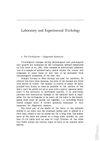1 citations,
December 2023 in “Animals” Winter provides the best fur quality for Rex rabbits due to seasonal changes in specific signaling pathways.
 1 citations,
September 2023 in “Journal of Investigative Dermatology”
1 citations,
September 2023 in “Journal of Investigative Dermatology” Melatonin may protect hair follicle cells from damage caused by a chemotherapy drug.
 1 citations,
July 2023 in “Chinese Medicine”
1 citations,
July 2023 in “Chinese Medicine” Shi-Bi-Man, a Traditional Chinese Medicine, helps grow hair by boosting lactic acid metabolism and activating hair follicle stem cells.
 1 citations,
July 2023 in “Biomimetics”
1 citations,
July 2023 in “Biomimetics” A new hair treatment using a natural polyphenol complex improves hair strength, reduces static, and protects against UV damage.
 1 citations,
April 2015 in “Current problems in dermatology”
1 citations,
April 2015 in “Current problems in dermatology” The document concludes that the trichogram is a useful tool for diagnosing hair loss and suggests semi-organ cultures for practical trichological research.
 1 citations,
May 2006 in “Expert Opinion on Therapeutic Patents”
1 citations,
May 2006 in “Expert Opinion on Therapeutic Patents” No FDA-approved treatments for chemotherapy-induced hair loss existed in 2006; more research was needed.
 July 2024 in “Journal of Investigative Dermatology”
July 2024 in “Journal of Investigative Dermatology” A single medium, PRIME AIRLIFT, supports better human hair follicle formation in grafts.
 May 2024 in “Proteome science”
May 2024 in “Proteome science” Bleaching damages hair by reducing the quality of keratin and keratin-associated proteins.
 May 2024 in “Clinical Cosmetic and Investigational Dermatology”
May 2024 in “Clinical Cosmetic and Investigational Dermatology” Manipulating cell cleanup processes could help treat hair loss.
 April 2024 in “Journal of translational medicine”
April 2024 in “Journal of translational medicine” MJ04, a new compound, effectively promotes hair growth and is a potential topical treatment for hair loss.
 March 2024 in “International Research Journal of Modernization in Engineering Technology and Science”
March 2024 in “International Research Journal of Modernization in Engineering Technology and Science” The herbal shampoo made hair shinier, smoother, and softer without side effects.
 March 2024 in “Journal of functional foods”
March 2024 in “Journal of functional foods” Collagen peptides from marine and bovine sources may help prevent hair loss by affecting hair follicle stem cells differently.

Herbal remedies might help with hair loss but need more research for safety and effectiveness.
 February 2024 in “International Journal of Molecular Sciences”
February 2024 in “International Journal of Molecular Sciences” Hair loss in Androgenetic Alopecia is caused by genetics, aging, and lifestyle, leading to hair follicle shrinkage and related health risks.
October 2023 in “Biomimetics” The new hair-dyeing shampoo is safe, colors hair evenly, and strengthens it.
 May 2023 in “Journal of Clinical Medicine”
May 2023 in “Journal of Clinical Medicine” New understanding and treatments for hair loss are improving, but more research is needed.
 August 2021 in “Journal of emerging technologies and innovative research”
August 2021 in “Journal of emerging technologies and innovative research” PRP combined with Ayurvedic medicine may effectively treat hair loss.
 April 2021 in “Sohag Medical Journal”
April 2021 in “Sohag Medical Journal” Alopecia areata is an autoimmune condition causing hair loss, linked to genetic factors and immune system issues, with no cure yet.
 December 2018 in “Journal of Medicinal and Aromatic Plant Sciences”
December 2018 in “Journal of Medicinal and Aromatic Plant Sciences” Some plants like Eclipta alba, Nardostachys jatamansi, and Rumex japonicus may help hair growth.
 November 2015 in “European Journal of Inflammation”
November 2015 in “European Journal of Inflammation” Cicatricial alopecia, a permanent hair loss condition, is mainly caused by damage to specific hair follicle stem cells and abnormal immune responses, with gene regulator PPAR-y and lipid metabolism disorders playing significant roles.
March 2023 in “International Journal of Molecular Sciences” ADSC-Exos with miR-122-5p can help treat hair loss by promoting hair growth.
 January 2022 in “Stem cell biology and regenerative medicine”
January 2022 in “Stem cell biology and regenerative medicine” The document concludes that hair follicle regeneration involves various factors like stem cells, noncoding dsRNA, lymphatic vessels, growth factors, minoxidil, exosomes, and induced pluripotent stem cells.
 June 2022 in “International Journal of Biomedicine”
June 2022 in “International Journal of Biomedicine” Erbium YAG laser treatment, combined with conventional therapy, can effectively reduce hair loss and promote hair growth in men with androgenetic alopecia.
 21 citations,
June 2017 in “Journal of Dermatological Treatment”
21 citations,
June 2017 in “Journal of Dermatological Treatment” Topical cetirizine improves hair density and thickness in androgenetic alopecia, but more research is needed.

New treatments for hair loss should target eight main causes and use specific plant compounds and peptides for better results.
 21 citations,
May 2017 in “International Journal of Dermatology”
21 citations,
May 2017 in “International Journal of Dermatology” Overweight smokers have worse hair loss.
 5 citations,
January 2013 in “Journal of Cosmetics, Dermatological Sciences and Applications”
5 citations,
January 2013 in “Journal of Cosmetics, Dermatological Sciences and Applications” New treatments for hair loss are promising.
 2 citations,
January 2023 in “Pharmaceuticals”
2 citations,
January 2023 in “Pharmaceuticals” Natural products and phytochemicals may help with hair regrowth, but more research is needed.
 December 2024 in “Antioxidants”
December 2024 in “Antioxidants” Luteolin can reduce hair graying in mice, with external treatment being more effective.
 June 2024 in “Georgetown medical review”
June 2024 in “Georgetown medical review” Finasteride treats hair loss but may cause low libido, erectile issues, and depression.


























